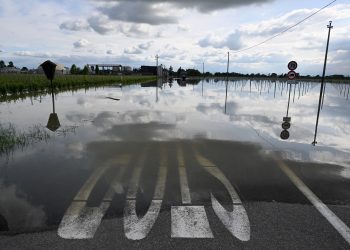Brussels – Food security, water crises, even premature deaths from excessive heat. With its extreme phenomena, climate change poses serious challenges to Europe and its member states, which will increasingly have to reckon with the economic price of global warming. The European Commission is already calculating how much has already been spent and how much, in anticipation, is likely to be spent. The communication to member states on climate change response contains an accounting and a warning: national budgets are in danger of finding themselves even more in disarray, and debt sustainability becomes an issue.
Data in hand, those provided by the Community Executive, it is estimated that the costs of drought alone amount to €9 billion per year and those of floods to more than €170 billion in total since 1980: “In the future, annual damage caused in Europe by coastal flooding could exceed €1.600 billion by 2100.”
It doesn’t end there. A “conservative” estimate indicates that “worsening climate impacts could reduce the UE’s GDP by about 7 per cent by the end of the century.” Without looking at a temporary horizon, the additional cumulative reduction in Gross Domestic Product for the European Union as a whole “could amount to 2.4 trillion euros over the period from 2031 to 2050 if global warming permanently exceeds the 1.5-degree threshold set by the Paris Agreement.”
The out-of-control climate already has a cost and will present an increasingly steep one. In some regions, it will be even worse, admits Maros Sefcovic, Commissioner for the Green Deal: “In southern Europe, the pressure could be even greater, especially for coastal regions and rural areas.” This emphasis confirms what was already denounced by the European Environmental Agency, whereby climate change seriously risks widening the north-south divide. And not only that.
Having to invest in prevention, risk mitigation, and adaptation has accounting implications. “The public budgets are the main source of hedging for these risks, but high debt levels already strain them,” the EU executive notes in its communication. As a result, “the implicit contingent liabilities stemming from climate risks could jeopardize the fiscal stability and sustainability of member states,” especially those like Italy with high debt-to-GDP ratios. This is why “work is underway to develop the projection of climate impacts on debt sustainability” of member countries. Specifically, the communication clarifies that to improve and integrate climate risk budgeting into national budget processes, the Commission is ready to support Member States in exchanging best practices and providing technical support and training. In addition, the Community Executive “will also work with Member States to fill data gaps, including to estimate national adaptation investment needs.”
It is a first step, stresses Wopke Hoekstra, Commissioner for Climate Action. “There are no actions that need to be implemented; this communication is about coordination and governance, the first-ever approach to this issue.”
English version by the Translation Service of Withub![[foto: Wikimedia Commons]](https://www.eunews.it/wp-content/uploads/2024/03/GlobalWarming.png)




![Una donna controlla le informazioni sul cibo specificate sulla confezione [foto: archivio]](https://www.eunews.it/wp-content/uploads/2014/12/Etichette-alimentari.jpg)

